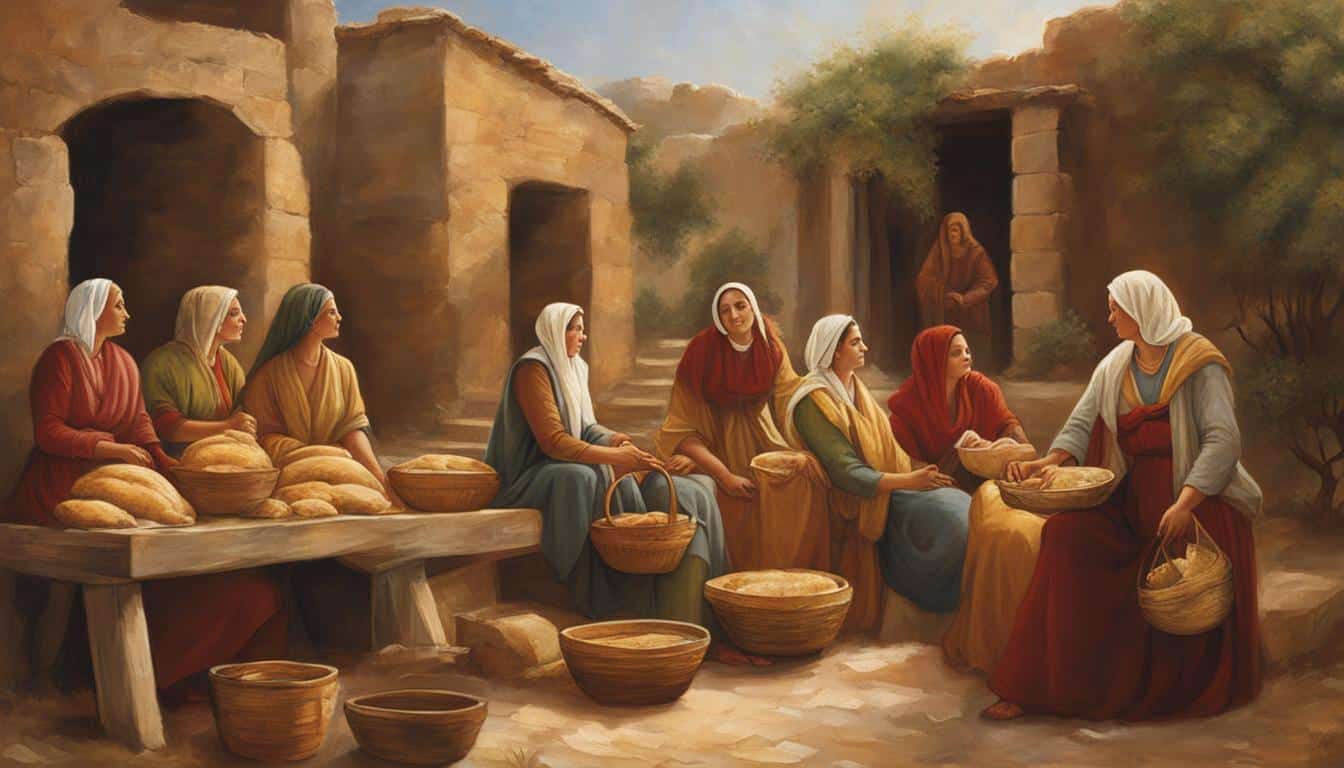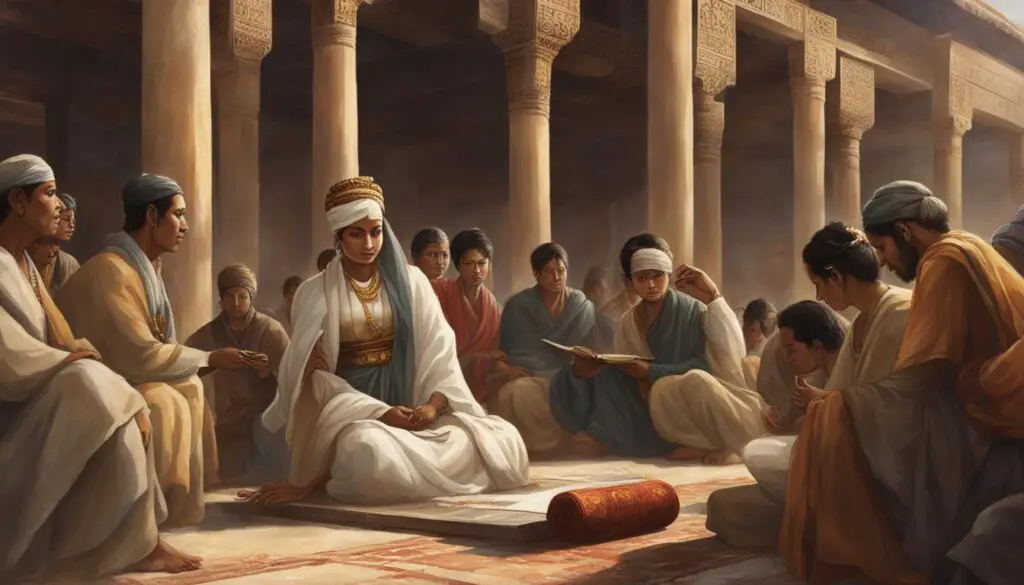
The Bible has had a profound and enduring impact throughout history. It contains a wealth of stories, poetry, and accounts that resonate with people from all walks of life. One aspect that stands out is the high regard for women, a perspective that was remarkably progressive for its time. In ancient Israel, women played active and diverse roles within their society, challenging traditional gender norms and contributing in various areas.
Key Takeaways:
- The Bible recognizes the significance of women in biblical society, highlighting their active participation in commerce, labor, and Temple worship.
- Women in ancient Israel held esteemed leadership positions, such as judges and prophetesses, showcasing their influence and wisdom.
- The New Testament reflects a shift in societal norms, restricting women to private roles, but Jesus challenges these norms by treating women with equality and respect.
- Examples of influential women in the Bible, such as Miriam, Deborah, and Mary Magdalene, showcase their contributions and resilience.
- While the Bible acknowledges the limitations placed on women, it also emphasizes their significant contributions and should be understood in a historical context.
Women in the Hebrew Scriptures
In the context of the Hebrew Scriptures, women played vital roles in the ancient Israelite society. They were not confined to domestic duties but actively participated in various aspects of the community. Women engaged in commerce, taking part in activities such as selling merchandise and managing real estate. They were also involved in manual labor, contributing to the workforce alongside men.
Religious life and worship were not exclusive to men; women had a significant presence in Temple activities. They participated in religious processions, played musical instruments, and offered prayers. Women even held leadership positions, demonstrating their influence and respect within the community. Miriam, for instance, led the women of Israel in worship, while Deborah served as a judge and prophetess.
Moreover, the Hebrew Scriptures depict examples of wise and gifted women who made notable contributions. Abigail, known for her intelligence and diplomacy, played a crucial role in averting conflict. The wise woman of Tekoa offered sage advice to King David, highlighting her wisdom and discernment. These women were celebrated for their wisdom and their ability to make a positive impact in their society.
| Women’s Roles in Ancient Israel | Examples |
|---|---|
| Commerce and Labor | Selling merchandise, managing real estate, engaging in manual labor |
| Religious Participation | Playing music, praying, participating in religious processions |
| Leadership Positions | Miriam leading worship, Deborah serving as a judge and prophetess |
| Wise and Gifted Women | Abigail’s diplomacy, the wise woman of Tekoa’s sage advice |
The presence of women in the Hebrew Scriptures showcases their active involvement in society, challenging the notion that their roles were limited to the private sphere. These women’s contributions were acknowledged and valued, representing a departure from the restrictive societal norms of their time.
Women’s Rights in New Testament Times
During the first century, women in New Testament times faced significant challenges and restrictions in society. Their social status and rights had deteriorated compared to women in ancient Israel. Women were segregated from men in various areas of life, including private, public, and religious settings. These restrictions limited their opportunities and rights, including their ability to testify in court, engage in commerce, and appear in public.
Despite these cultural norms, the New Testament narratives also highlight Jesus’ revolutionary treatment of women. Jesus challenged the societal expectations and norms by actively including women in his ministry. He engaged in meaningful conversations with women, valued their faith, and defended their choices. Jesus recognized the inherent worth and equality of women, regardless of societal standards.
Several women played crucial roles in Jesus’ life and ministry. Mary Magdalene, for example, was the first to witness Jesus’ resurrection, a significant event in Christian belief. This demonstrates Jesus’ recognition of women’s importance and involvement in the unfolding of key events. These examples emphasize the significance of women’s contributions and their value within the context of the New Testament.
The Treatment of Women in the New Testament
The New Testament portrays women as active participants in the life of Jesus. They provided support, offered hospitality, and actively engaged in conversations with him. Jesus’ interactions with women challenged societal expectations and provided a platform for them to have a voice and play significant roles. This portrayal differs from the prevailing cultural norms of the time and highlights Jesus’ commitment to inclusivity and equality.
While the New Testament narratives reflect the cultural context of the time, they also offer glimpses of women’s influential roles and the respect they received from Jesus. These examples inspire a reevaluation of the societal norms that limited women’s rights and underscore the importance of recognizing the valuable contributions women made within the biblical narrative.

| Aspect | Restrictions |
|---|---|
| Legal Rights | – Limited ability to testify in court |
| Commercial Activities | – Restrictions on engaging in commerce |
| Public Appearances | – Separation from men in public life |
| Religious Participation | – Limited involvement in religious practices |
The table above illustrates the restrictions placed on women during New Testament times. These limitations highlight the societal norms that marginalized women and hindered their ability to fully engage in various aspects of life. However, it is essential to acknowledge that Jesus’ inclusive approach challenged these norms and recognized the value and contributions of women.
Conclusion
Throughout the Bible, women played crucial and diverse roles in society, making significant contributions despite the limitations imposed upon them. While societal norms of the time restricted women’s rights and relegated them to private roles, the scriptures offer examples of remarkable women who challenged these expectations and were valued for their talents and dedication.
Jesus, in particular, exemplified a radical approach to women, treating them with respect and equality. He shattered the societal barriers, including women in his ministry and acknowledging their worth. Women like Mary Magdalene played a pivotal role in Jesus’ life and were among the first witnesses to his resurrection.
When examining the role of women in biblical society, it is crucial to understand their historical context, recognizing both the limitations forced upon them and their immense contributions. The Bible’s stories reflect a mix of societal norms and progressive ideals, showcasing the remarkable resilience and strength of women throughout history.
FAQ
What roles did women play in ancient Israel?
In ancient Israel, women actively participated in the community, engaging in commerce, labor, and Temple worship. They held leadership positions as judges and prophetesses.
Did women have rights and freedoms in biblical times?
Yes, women in ancient Israel enjoyed more rights and freedoms compared to women in the first century. They were involved in various aspects of society and were honored for their contributions.
How did Jesus treat women in the New Testament?
Jesus challenged societal norms by treating women with respect and equality. He included them in his ministry, engaged in conversations with them, and acknowledged their faith and contributions.
Were women limited to private roles in the first century?
Yes, during the first century, societal norms restricted women to private roles and limited their rights in public, legal, and religious life.
Who were some influential women in biblical society?
There were many influential women in biblical society, including Miriam, Deborah, Abigail, and Mary Magdalene, who made significant contributions and were honored for their wisdom, leadership, and faith.








